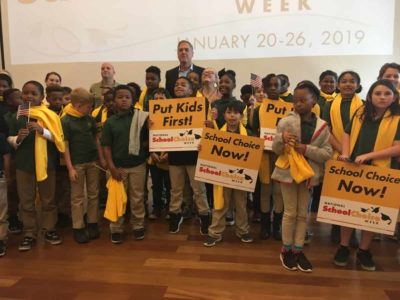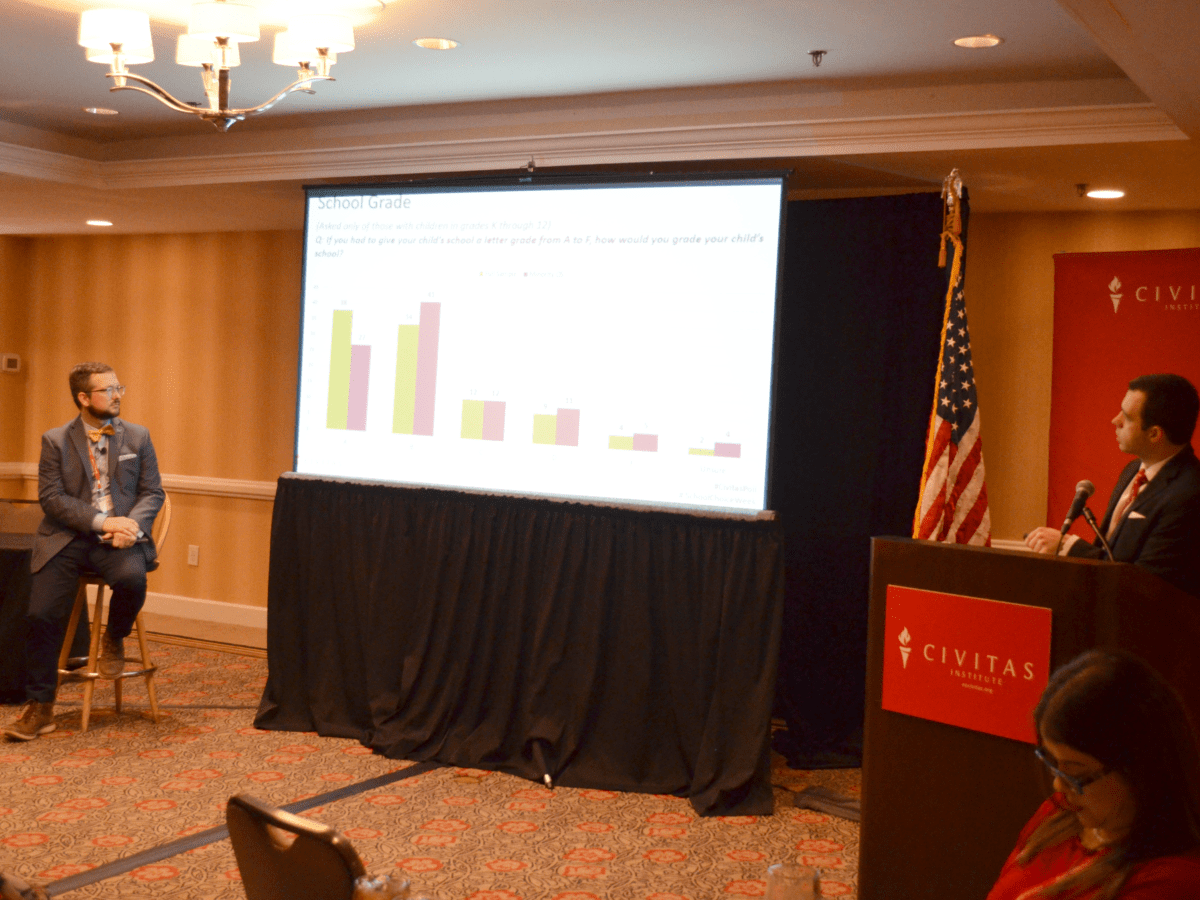

Eighty-one percent of people surveyed for the latest Civitas School Choice poll said that parents should be the ones to choose where their kids go to school. Fifty-eight percent were in favor of charter schools, while 46% said that charter schools contribute to school segregation.
These were some of the findings presented at the Civitas school choice luncheon in Raleigh today. Legislators in attendance also weighed in on how they see the issue of school choice.
“How could anyone argue about the concept that a parent should decide what’s best for their child?” said state Senator Jim Perry, R-Wayne, during a legislative panel discussion.
The survey sampled 800 registered voters. And in response to criticisms that school choice polls often under-represent minority voters, the surveyors included an over-sample of 300 non-white respondents, according to Donald Bryson, president and CEO of the Civitas Institute.
Seventy-seven percent of those polled had no kids in grades K-12. Of those with children in grades K-12, 64% had their children in traditional public schools.
The party registration of the respondents breaks down like this: Thirty-one percent Republican, 37% Democrat, and 32% unaffiliated. Twenty-five percent of respondents described themselves as very conservative, 21% somewhat conservative, 29% moderate, 12% somewhat liberal, 9% very liberal, and 5% were unsure.
Bryson said that the large percentage of respondents who said that parents should be the ones to choose their kids’ schools indicates that school choice has gone mainstream.
“Eighty-one percent is a very strong statement,” he said. “This is no longer a controversial statement.”
When only parents of kids in grades K-12 were polled and asked what kind of school they would put their child in if cost and location were not a factor, most parents would choose a school that was not a traditional public school, according to the survey. However, traditional public school was the largest single category chosen.
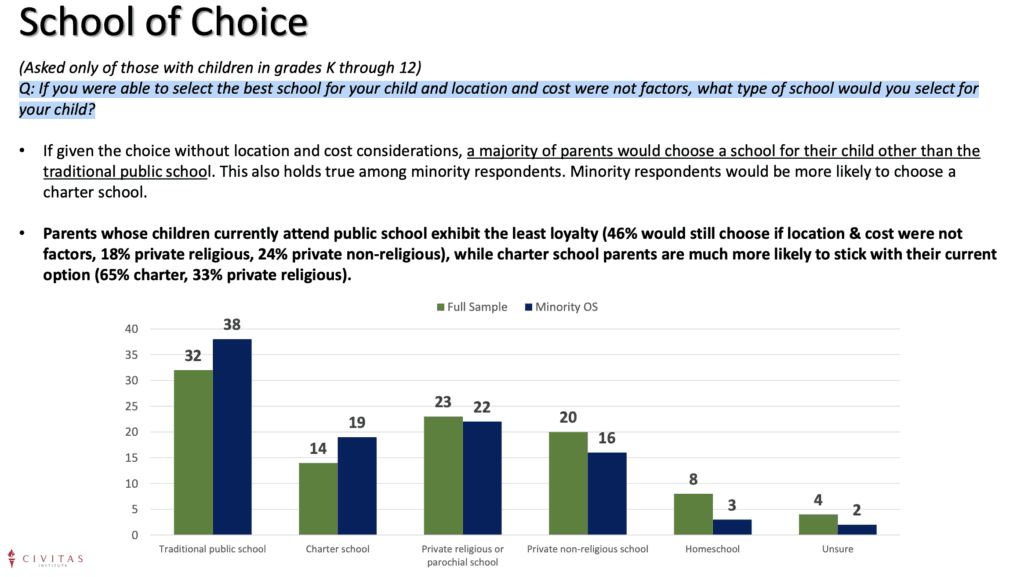

When the presentation came to the question of whether respondents believe charter schools lead to segregation, Bryson pointed out how odd the numbers were for this question versus the numbers when it came to support of charter schools.
“You have 46% of the overall sample … who believe that charter schools lead to segregation. But then you had 58%, even higher, that approved of charter schools,” he said. “Which means just throwing out the term segregation doesn’t get to the heart of the issue.”
When it came to the 58% of those polled who approved of charter schools, Drew Catt, director of state research and special projects at EdChoice — a group that partnered with Civitas for the survey — said he was surprised.
“That’s lower than what we’ve seen at the national level,” he said, adding later: “It makes me curious what’s happening with the charter sector here.”
Sixty-seven percent of all those surveyed approved either strongly or somewhat with opportunity scholarships — a program that gives low-income students $4,200 to attend the private school of their choice. Minority respondents were the most supportive, with 78% in favor.
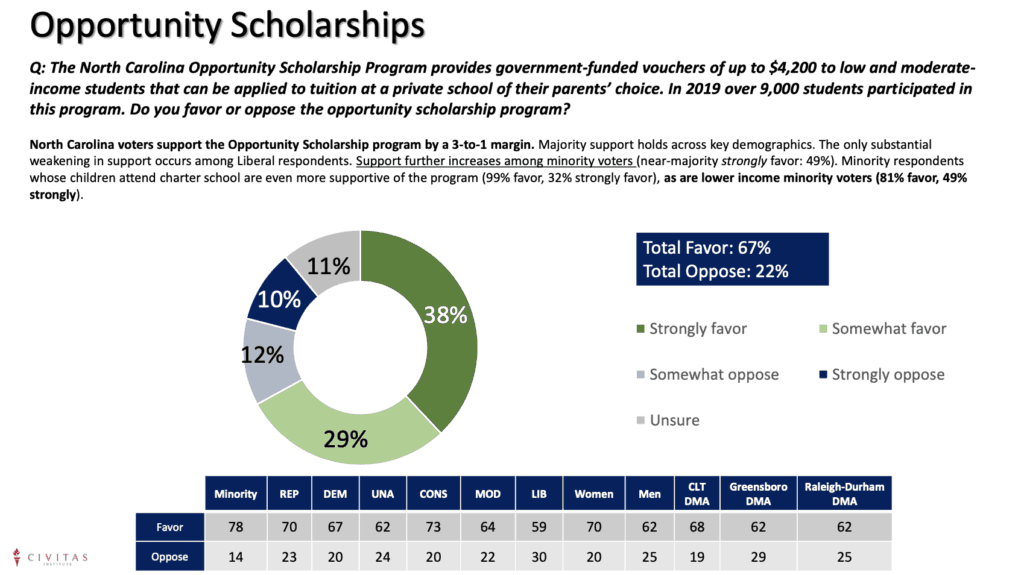

When it comes to who should be eligible for school choice options, such as opportunity scholarships, 49% of respondents said that all students should be eligible regardless of family income.
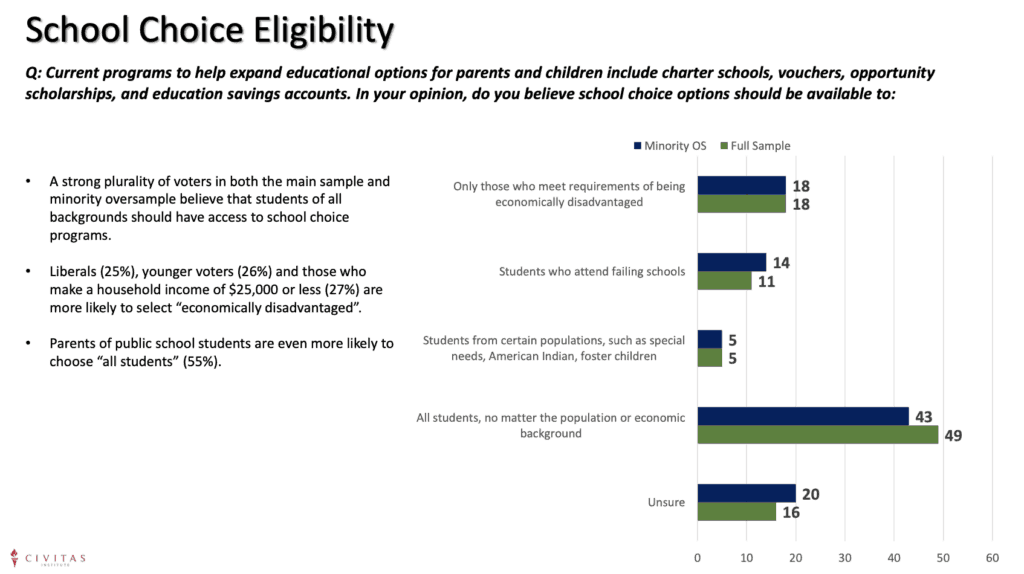

“The population is saying a child is a child is a child,” Bryson said.
A press release from Sen. Deanna Ballard, R-Watauga, said that according to the North Carolina State Education Assistance Authority, 12,183 students have received an opportunity scholarship. She was in attendance at the event, and said in the press release that families have the right to choose. She also criticized Democratic Gov. Roy Cooper for his stance on school choice.
“Governor Roy Cooper and legislative Democrats have said they would defund the Opportunity Scholarship program and put a moratorium on new charter schools,” she said in the press release. “It’s clear these programs make a difference in the lives of North Carolinians. Education is the great equalizer, and programs like the Opportunity Scholarship provide low-income and working-class families with the resources to choose the school that is best for their children.”
At the event, attendees also got to hear from school choice parents, including Heidy Gomez.
She came to the United States from Venezuela 17 years ago, and she is a single mother with three children: one with special needs in private school, a 15-year-old in public high school, and a 13-year-old in a private religious school.
“When I hear sometimes about school choice, I have to stand up and say this is not to support or to be against a public school or a private school system,” she said. She added that she stands up for school choice because she is the one who knows what her kids need.
During the panel discussion with legislators, a mix of state senators and representatives discussed how they see the choice landscape.
Rep. Jason Saine, R-Lincoln, said a lot of the acrimony over school choice comes from a vocal minority that doesn’t hesitate to contact their representatives. Those who are happy with their school, including those who partake of school choice options, are less likely to reach out to their representatives, he said.
“You don’t call your legislator and say, ‘Hey, I just wanted to call and let you know how happy I am today,’” he said, adding later: “So folks who support school choice, I would absolutely tell you to reaffirm that with your legislator. Because we don’t hear that.”
Rep. Craig Horn, R-Union, was asked about the WestEd Leandro report, which didn’t have a lot to say about school choice. He said that school choice should be part of the discussion about reforming education in North Carolina.
“As much as I appreciate the judge’s order … there are a lot of pieces and parts missing from that,” he said. “They were missing from the WestEd report. And it’s because they didn’t talk to those people.”
Sen. Rick Horner, R-Nash, said given the political dynamics in the state, there is unlikely to be significant school choice-related legislation in the upcoming legislative short session. The Republican-led General Assembly got into a stalemate with Gov. Cooper over the two-year budget during the long session, and session adjourned without a comprehensive spending plan.
“There’s nothing that’s going to happen,” he said.
When it comes to the state of school choice in North Carolina, Saine said the state has come a long way, but also has a long road ahead.
“We’ve accomplished a lot in North Carolina,” he said. “Our next thing that we need to do — we’ve already got proof of concept, we’ve got success — we’ve got to spread the good word.”
See a press release from Civitas and the full survey results here. Methodology: The sample size for the survey is 800 registered voters in North Carolina and the margin of error is +/-3.46% at a 95% confidence interval, meaning that if this survey were repeated, results would not vary from the population by more than 3.46 percentage points 19 times out of 20. Responses were gathered via landline interviews conducted using Interactive Voice Response (IVR) technology and online interviews conducted with a representative panel of voters. Demographics were adjusted to reflect the population from which the sample was drawn. The survey was conducted January 20 – 22, 2020 by Harper Polling. The total percentages of responses may not equal 100% due to rounding.




